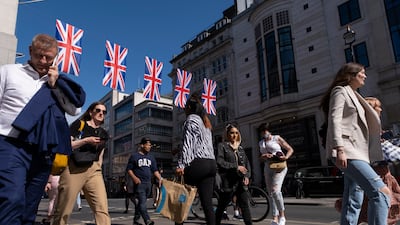As tourist numbers around the world return to their pre-pandemic levels, the UK is missing out because of a government policy that denies visitors duty-free shopping, data shows.
Analysis by the tax-free shopping data company Global Blue shows that tourists from the US are now spending more than triple the amount on duty-free goods in France and Spain than they did before the pandemic in 2019.
Last year, tourists visiting Britain from the GCC states spent 35 per cent less than they did before the Covid pandemic, but spent double in France and 66 per cent more in Italy.
Meanwhile, tourists from the US are now spending more than triple the amount on duty-free goods in France and Spain that they did before the pandemic in 2019, the Global Blue figures showed.
As Europe and the UK head into the busy spring and summer tourist seasons, leading British business figures have again called on the government to reintroduce duty-free shopping so that retailers have a chance of competing with those in the EU.
At three million, tourist visits to the UK in December last year were 7 per cent lower than they were in the previous month, according to the Office for National Statistics (ONS).
However, the December figure represent a 14 per cent drop on the pre-pandemic figure of 3.4 million in December 2019.
Meanwhile, the ONS said that compared with December 2019, tourist spending in December last year was down 11 per cent. It also said on Wednesday that spending in the UK by overseas residents increased from £2.1 billion ($2.61 billion) in November last year to £2.4 billion in December, an increase of 14 per cent.
Post Brexit price hikes
Before Brexit in 2020, tourists could receive a VAT refund on items bought in shops on Britain's high streets, airports and other departure points from the country, which they exported in their personal luggage.
When that VAT relief was removed after Brexit, it essentially made the same goods immediately 20 per cent more expensive.
VAT refunds for tourists were going to be reinstated in Kwasi Kwarteng's ill-fated “mini-budget” last year, but were subsequently dropped by his successor as chancellor, Jeremy Hunt.

'Spectacular own goal'
Gerry Murphy, chairman of the luxury clothing maker Burberry, accused Prime Minister Rishi Sunak of a “spectacular own goal” over the issue at a gathering of business leaders earlier this week.
Mr Murphy said the decision to scrap the VAT refund for tourists has made the UK the “least attractive” shopping destination in Europe.
Calls to bring back the VAT refund scheme for tourists have been growing recently, as data shows that visitors are choosing other destinations to do their shopping.
A letter signed by, among others, the chief executives of Heathrow Airport and the department stores Selfridges and Harrods, claimed London had been “severely disadvantaged” by the dropping of the VAT refund.
“Our rich ecosystem of shops, hospitality venues, and cultural attractions, is heavily dependent on both domestic and international tourists,” London mayor Sadiq Khan wrote in the same letter, adding that the reintroduction of duty-free shopping would be a “much-needed boost” to London's retailers.
Those calling for the return of VAT refunds point out that it's not just retailers who would benefit, but also hotels, restaurants and theatres who would draw increased visitor numbers if tourists were attracted back by duty-free shopping.
“People are making choices as to where they make their bigger purchases and they're actually going over to Europe to make those purchases,” Rob McFarlane. the chief commercial officer at the luxury goods company Halcyon Days told the BBC.
Earlier this week, a source told The Telegraph newspaper that the government would not be looking to reintroduce the VAT refund scheme.
The Treasury has pointed out before that reversing the earlier decision to stop the scheme would cost the public coffers somewhere in the region of £1.4 billion.
Douglas McWilliams, deputy chairman of the Centre for Economics and Business Research, has estimated that the UK will lose a million tourists and £3 billon of their money this year alone, because the duty-free shopping scheme is absent.
“It appears that the resistance is from Treasury officials whose models are being proved wrong,” Mr McWilliams told The National.
“The officials, even though all the evidence seems to suggest they are wrong, seem not to want to admit that they were so. This I understand is why the campaign against ‘the tourist tax’ has gone public.”
Mr McWilliams told The National that he believes the whole situation to be “so serious an issue of official malfeasance, which has cost jobs, GDP and tax revenue”, that he has requested an inquiry into “how the officials got it so badly wrong”.
Coronation boost
It is hoped that the coronation of King Charles III in early May will provide a boost to overall tourist numbers to the UK, which continue to struggle in the wake of the pandemic.
While Britain welcomed 29.7 million visitors last year, which was still nearly a third below 2019, Queen Elizabeth's platinum jubilee attracted an extra 2.6 million visitors to London, according to VisitBritain. The coronation is expected to bring in a similar number.
“We can see a 10 per cent increase in flight bookings through May from the America market,” said Patricia Yates, chief executive of VisitBritain.
“The big question mark is, of course, China, which was our second-most-valuable market and still not coming back quite in the numbers we would like to see.”


